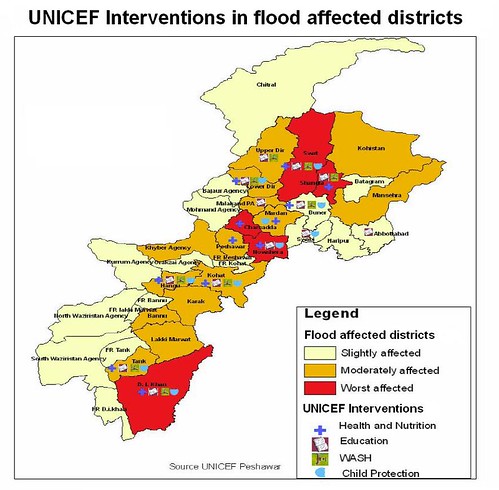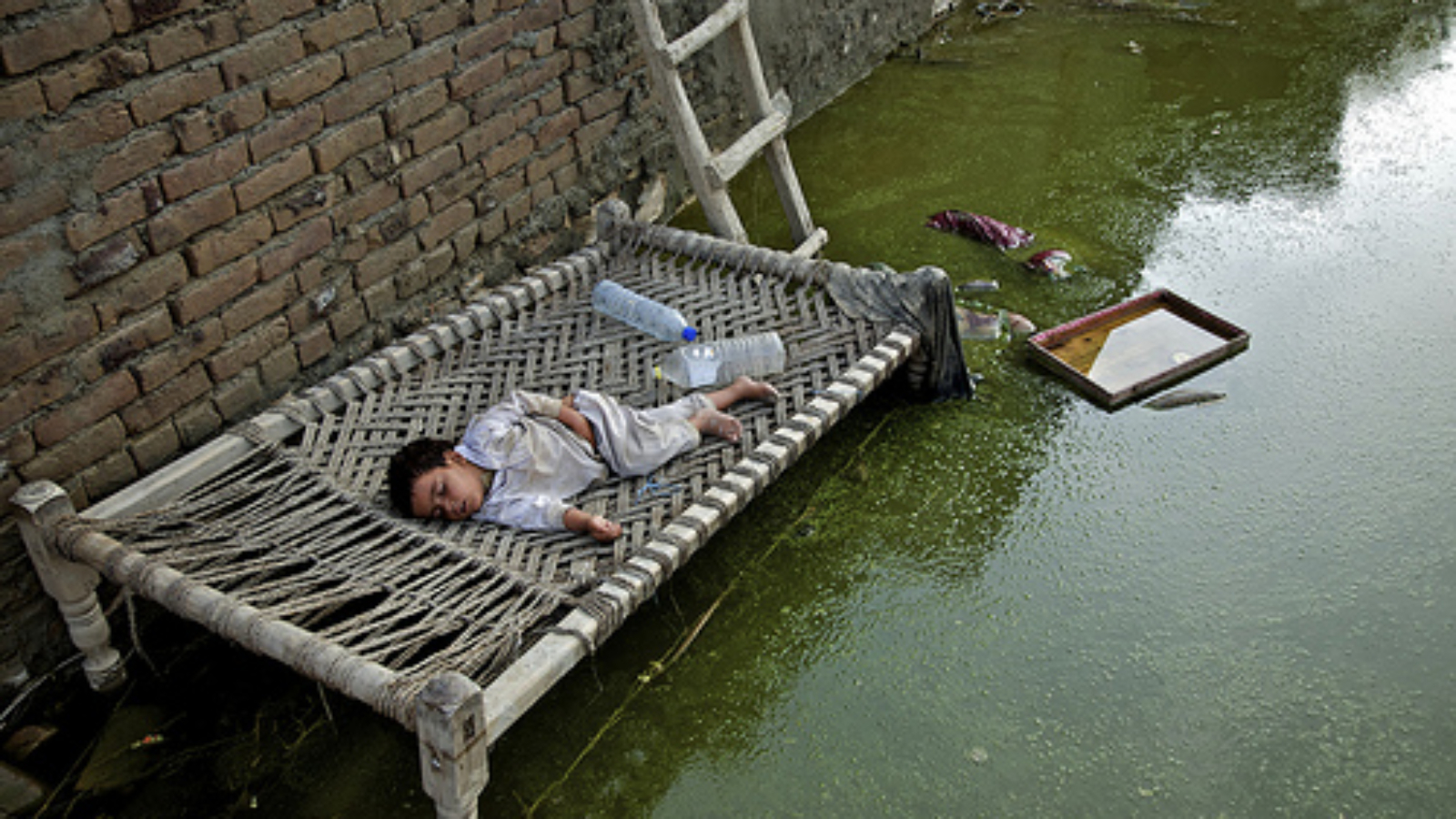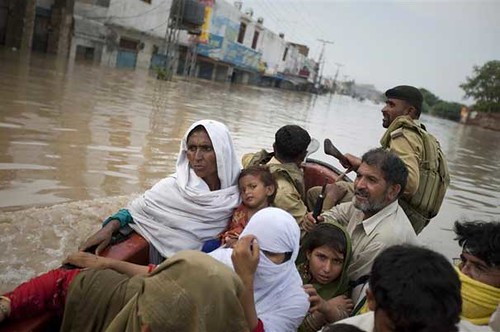The international community’s response to the recent and continuing flooding in Pakistan has been both inadequate and irresponsible, betraying a basic failure to understand the truly global implications of the crisis for international security. The reaction of governments around the world and the media coverage in particular further suggest a fundamental lack of seriousness in addressing the very real problems at hand that are threatening the world community, and not just Pakistan.
While the early effort of the United States – including the donation of equipment, manpower and funds, as well as a vocal appeal for help to world leaders and Americans by the Obama administration – was admirable, the collective international response has been largely disgraceful. China, supposedly one of Pakistan’s closest allies, initially offered a paltry $1.5m before being shamed into increasing its pledge to $10m – still a pitiful figure in the context of China’s foreign currency reserves, which exceed $2.4 trillion. The United Arab Emirates – a state literally built by Pakistani and Indian laborers, service workers and executives – pledged an equally low $5m, per a self-congratulatory press release posted on the website of its Washington embassy. Qatar – another Gulf state that is always eager to buy international recognition through purchases of expensive toys abroad, and one that is sitting on some of the largest hydrocarbon resources in the world – pledged a mere $1.6m as of 30 August, according to a recent UN report. Singapore – home to one of the largest sovereign wealth funds in the world – pledged a mere $100,000, which is less than even what Afghanistan donated. Malaysia – a country that frequently critiques Western decadence and poses as a leader in the Muslim world – donated the same amount as war-torn Afghanistan. Irresponsibility does not rest solely with Muslim or developing nations, however. France, for all its blabbering about the international community and international society during the lead up to the Iraq war, when it could score easy points at the expense of the United States, at first pledged a mere $1m, and thus far has donated only $2.5m, according to the UN. Even the American response is hamstrung by Washington’s failure to stand up to protectionist interests at home and lift the tariff on Pakistani textile imports, holding back, by some estimates, $5bn in Pakistani export earnings in a sector that employs half the country’s workforce.
Media coverage has been remarkable for its at times almost cold-blooded treatment of the story. Some media outlets ran the expected heart-wrenching stories about victims but juxtaposed them with pieces describing the possible reasons for the poor response to the relief effort. One such item on the BBC’s website, for example, lists “donor fatigue”, “corruption”, “terrorism”, “timing”, and being the “‘wrong’ disaster” [sic] as justification for the poor international, governmental and grass-roots-level responses to the floods before reproducing a string of “selected”, uniformly unsympathetic comments suggesting, amongst other falsehoods, that the floods – the worst in 80 years – are merely another  monsoon. The Indian media, for its part, has had a field day over the initial reluctance of Pakistan’s government to accept India’s offer of $5m in aid (hardly a figure worthy of a “BRIC” economy aspiring to the UN Security Council), making no mention of India’s own initial refusals of aid during the tsunami in 2005. Such prominent narratives would lead us believe that Pakistan is either willingly digging its own grave or merely paying for past sins. Stories that mention corruption and duplicity in the Pakistani government and give scant attention to the very good work of Western NGOs and the UN (to say nothing of the many well-respected Pakistani humanitarian NGOs like the Edhi Foundation) only contribute to the reluctance of other governments and the larger global community to provide money and other forms of aid to Pakistan.
monsoon. The Indian media, for its part, has had a field day over the initial reluctance of Pakistan’s government to accept India’s offer of $5m in aid (hardly a figure worthy of a “BRIC” economy aspiring to the UN Security Council), making no mention of India’s own initial refusals of aid during the tsunami in 2005. Such prominent narratives would lead us believe that Pakistan is either willingly digging its own grave or merely paying for past sins. Stories that mention corruption and duplicity in the Pakistani government and give scant attention to the very good work of Western NGOs and the UN (to say nothing of the many well-respected Pakistani humanitarian NGOs like the Edhi Foundation) only contribute to the reluctance of other governments and the larger global community to provide money and other forms of aid to Pakistan.
The international community’s tight-fisted response and the jaded portrayal of the floods in the public sphere diminish the significance of what can be described simply as a huge-scale humanitarian catastrophe of global consequence. With more than 170m citizens, Pakistan is the sixth most populous country in the world, and the second most populous in the Muslim world, where the United States and its allies are engaged in a struggle for “hearts and minds” that has now lasted for ten years. The disaster has flooded, literally, the heart of Pakistan, devastating heavily populated agrarian areas from North to South, directly affecting more than 1 in 10 Pakistanis, and indirectly exacting a heavy toll on a much larger percentage of the population. Indeed, some estimates suggest Pakistani inflation may rise from the previously forecast rate of 9.5% to 25% in 2010-2011, while real GDP growth will almost certainly fall well short of the pre-flood target of 4.1%. Presently numbering nearly 20m (and the number is growing), there are more direct victims of the Pakistan flooding than there were of the Indian Ocean tsunami, Haiti earthquake, and Kashmir earthquake combined. Senior American diplomat Richard Holbrooke notes that the area underwater is larger than Italy. The number of people directly affected by the flooding is more than 10 times greater than those hit by Hurricane Katrina, according to some estimates, and yet the UAE offered some $100m to the US during Katrina, but offered only a tiny fraction of that figure to Pakistan in spite of the greater scale of the current disaster. There are more Pakistani flood victims than there are Palestinians in the world; yet the Palestinian cause has driven countries to war, while the Pakistani crisis barely motivates these same countries to act.
The unenthusiastic international response is not merely another moral failure of global society to aid its most vulnerable members (although, certainly, it is a new low). The trickle of aid flowing to Pakistan and the ambivalent media coverage of the disaster reveal that the international community has not grasped its scale or foreseen the potentially more serious and far reaching consequences of inaction.
As much as it may horrify the well-informed outside observer, the slow and halfhearted international response to their country’s plight is nothing new to many Pakistanis, who still remember the loneliness of the 1990s, at the beginning of which the U.S. was happy to drop its decades-long special relationship with Pakistan after the Soviets had left Afghanistan and India had opened its markets. During this time, Washington not only cut its open military cooperation with Pakistan, among other measures, stopping arms sales to the country, but famously even refused to return Pakistan’s advance payments for equipment that Washington refused to deliver. In this context of isolation, the Pakistani security establishment accelerated its search for “strategic depth” and security guarantees – which took tangible shape in the Taliban and the Pakistani nuclear arsenal. Memories of the disappointment and abandonment experienced during those years run deep and wide in Pakistani politics – extending beyond the security elite to political groups of various stripes, and not without reason.
However, while suspicions linger on both sides, American-Pakistani relations have materially improved since the U.S.-led invasion of Afghanistan in 2001, exerting a positive influence on the region and, by extension, the rest of the world in the form of a united front against terrorism. Moreover, persistent rumors of ISI duplicity notwithstanding, the repeated militant attacks on military targets and heavy death toll among the Pakistani military and civilian population evince the Pakistani state and society’s genuine participation in the fight against extremist terror in the country.
Certainly, the international response to Pakistan’s current plight is a test of these improved relations. A positive American-led aid-effort would only continue the strengthening of Pakistan’s ties with the West and muffle the voices of those who oppose an alliance with it. However, failure to invigorate the response will further fan bad memories of a painful and recent past among Pakistanis, effectively handing a huge propaganda victory to the country’s extremist militants, who have been proactively exploiting the West’s tepid response to the disaster. Indeed, the recent reports of attacks by extremists on foreign flood-aid workers highlights the degree to which the extremists view foreign aid to Pakistan’s flood victims as a threat to their movement.
Success for the militants would undoubtedly hurt the West’s war effort in Afghanistan, but its significance would not end there. Global security would be greatly threatened should militant actions, by instigating further deterioration of an already grave situation, lead to the tearing apart of the world’s sixth most populous nation, with the attendant risk of military conflict as well as mass population movements and economic dislocation across borders
For example, the floods are a disaster economically not only for Pakistan, but for the broader region as a whole. At least 2m tons of Pakistani wheat exports have been scrapped due to the flooding, placing additional pressure on global wheat prices after Russian exports were cut due to recent droughts and fires in the former Soviet Union. Exports of rice – of which Pakistan is the world’s third-largest producer – are forecast to fall by at least 22%. According to the UN Food and Agriculture Organization, Pakistan is the second-largest producer of chickpeas in the world – a cheap source of protein that is central to the diets of millions of people across the Middle East and South Asia. The higher food prices resulting from the current and projected shortages of such agricultural staples will hurt lower-income individuals worldwide, especially in those areas of the developing world that depend on Pakistani agricultural exports. Moreover, Pakistan’s diminished agricultural production capacity threatens to be a multi-year phenomenon as farmers are unable to plant the next crop because much of the country’s key infrastructure is literally under water. While an unexpectedly strong world agricultural surplus may help to steady markets for a while, the long-term stability of world food prices is very much at risk.
The sheer size of the population movements within Pakistan also presents a regional security challenge. The city of Karachi – the world’s third-most populous – is seeing large numbers of incoming refugees from the flood-zones, increasing the strain on already limited municipal resources and threatening the fragile peace among the various ethnic groups that live there. It is not out of the question that refugees could attempt mass migrations outside Pakistan. Such a “black swan” event could take the form of a flood of refugees to India, with destabilizing implications for the region.
In short, as much as Europe, Saudi Arabia, and the UAE may worry about the Iranian nuclear program or India may fret over the Pakistani bomb, the irony is that water may prove to be the real danger in that the floods have not only affected tens of millions of Pakistanis but threaten global security, both directly – in terms of the ongoing fight against terrorism – and indirectly – in terms of the broader social, economic, and political consequences of an insufficiently serious global response to the crisis.
World governments continue to ignore the scale and significance of the disaster in Pakistan at their own peril. Even if they attach no importance to the very valid moral and humanitarian reasons to help some of the poorest and most vulnerable members of the human family, governments around the world would do well to recognize that self-interest is also part of the case for helping Pakistan.
Hassan Malik is a PhD candidate in international history at Harvard University and previously worked in investment banking for J.P. Morgan and Troika Dialog in New York and Moscow after graduating from the University of Chicago.
Photos via Flickr users UNICEF, Oxfam International, Giro555


